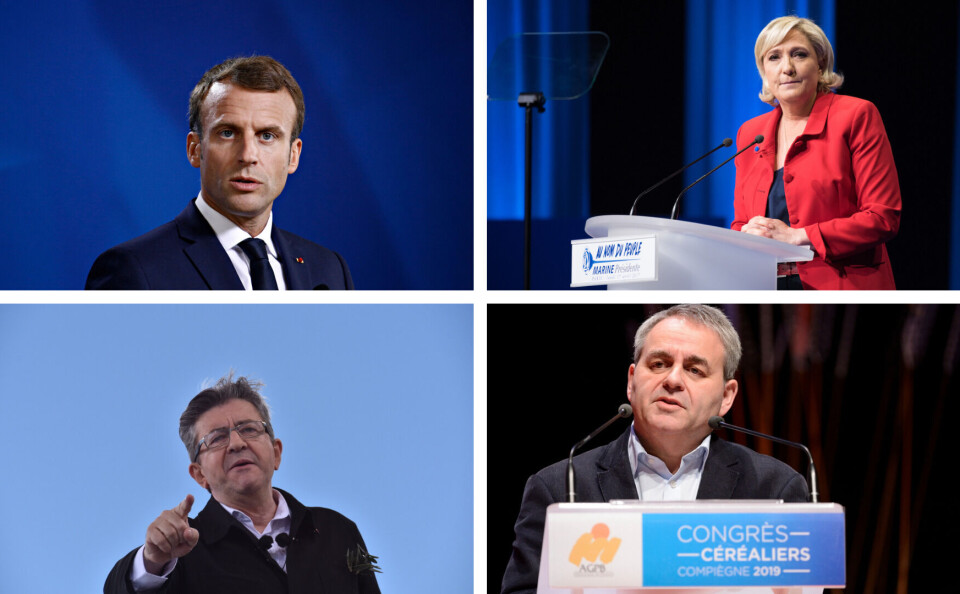-
Many Société Générale customers to be charged additional fees from April
There is some good news for international banking and instant transfers, however
-
Why gas prices in France are rising in April - and by how much
It comes after six consecutive monthly rises. Try these tips to reduce your bills
-
New notaire data suggests easing of Paris property crisis
Property experts have talked of ‘easing pressure’ and ‘breathing space’ after a four-year slump
France’s 2022 presidential election hopefuls race to find 500 backers
The election takes place in April but in order to stand candidates need the backing of 500 elected representatives. We explain the system and how the main candidates fared in a recent poll

The first round of France’s presidential election will take place next year on April 10, but in order for a candidate to stand, they must receive the backing of 500 elected representatives.
These 500 signatures, known as parrainages in French, must come from officials in at least 30 different departments, with no more than a tenth of them from one single department.
The race to gather signatures has already begun in France, with many candidates from smaller parties starting early to have a better chance of reaching the 500 target.
All candidates have until at the latest six weeks before the first round of voting, meaning they require the 500 names before March 16, 2022.
Who are the signatories?
In the last elections in 2017, 42,000 elected representatives were entitled to present a candidate for the presidential election. However, only 14,296 signatures were given. This number has steadily been decreasing over time.
In 2007, 17,815 local elected representatives supported a candidate and in 2012, there were 15,047.
Elected representatives who can give a signature include MPs, senators, representatives of the European Parliament, mayors and presidents of local authorities, councillors of Paris and the Metropolis of Lyon, as well as departmental and regional councillors.
The system of parrainages began in 1962 under President Charles de Gualle, with the intention of limiting the number of fringe candidates. At the time, candidates only required 100 backers. This was increased to 500 in 1976.
An oddity of the system means that elected representatives with the right to give a signature can back a candidate who has not officially declared his or herself as a presidential candidate.
Who are the candidates for the 2022 presidential elections?
There are currently a dozen or so people who have officially declared their candidacy for the presidential elections. However, some of those belonging to bigger parties will have to face off against other members of the same party in primaries.
This is the case of Valérie Pécresse, president of the Ile-de-France region, who will run against Eric Ciotti, Alpes-Maritimes’ MP, to become Les Républicains’ sole presidential candidate.
Former Brexit negotiator Michel Barnier will also be in the running.
Read more: EU Brexit negotiator Michel Barnier announces French presidential bid
Centre-right candidate Xavier Bertrand, who is the president of the regional council of Hauts-de-France, is also another strong contender in the elections.
There will also be a run off between candidates representing the green party, Europe Écologie-Les Verts.
French environmentalist and MEP Yannick Jadot will face Eric Piolle, mayor of Grenoble and Delphine Batho former ecology minister under François Hollande.
Other candidates have already been nominated by their parties, such as the far-right Marine Le Pen, president of the Rassemblement National (RN), the far-left Jean-Luc Mélenchon, MP for Bouches-du-Rhône and leader of La France Insoumise (LFI), and Fabien Roussel, leader of the Parti communiste français.
Extreme-right wing polemicist Éric Zemmour has not officially declared his candidacy, but he has received strong support on social media. If he does stand, it could split the far-right wing voters.
Paris mayor Anne Hidalgo announced her candidacy on September 12.
Emmanuel Macron has not yet made an official statement, but the current president is the clear favourite to stand as candidate for his party La République en marche (LREM).
Mr Macron and Ms Le Pen are the favourites to win in 2022. The two faced off in a second round of voting in 2017, with Mr Macron winning decisively.
If voting goes to a second round in 2022, Mr Macron is currently the favourite, according to a poll carried out between September 10 and 13 by Harris Insights & Analytics, a market research company.
The poll sampled 1,340 people and found that 54% would vote for Mr Macron, and 46% would vote for Ms Le Pen.
Xavier Bertrand and Valérie Pécresse are the leading right-wing candidates, the poll found, polling at 15% and 14% respectively.
Jean-Luc Mélenchon is leading the way among left-wing candidates, polling at 11%.
The parrainages in 2017
For the last presidential elections in France in 2017, 11 candidates successfully gathered 500 signatures. This was out of a total of 61 names.
Not all of the 61 had declared themselves as candidates with some being backed without asking for it.
François Fillon, who was candidate for Les Républicains, received the most signatures, with 3,635.
Benoît Hamon, who stood for the Parti socialiste, came second with 2,039 signatures. Macron received 1,829 and Mélenchon got 805.
Marine Le Pen, who went on to face Emmanuel Macron in a second round of voting in the 2017 elections, received 627.
Related stories:
Ce que femme veut: A French expression you may hear today
Socialist Paris mayor Anne Hidalgo to run for French presidency 2022
Far-right Marine Le Pen launches presidential bid on theme of freedom
























